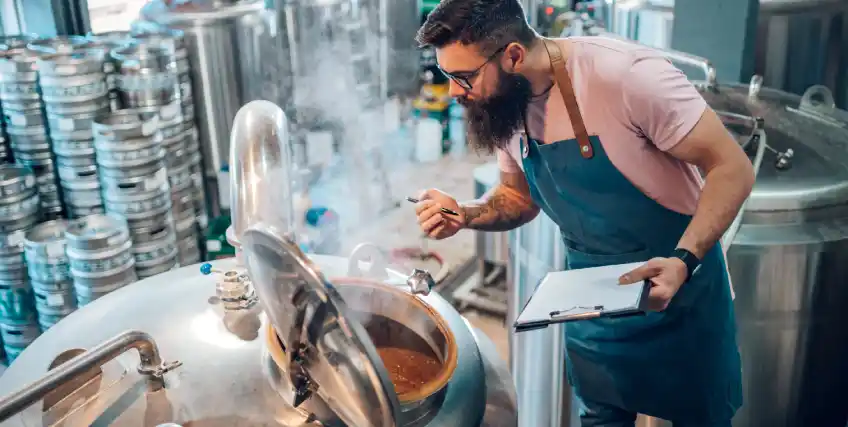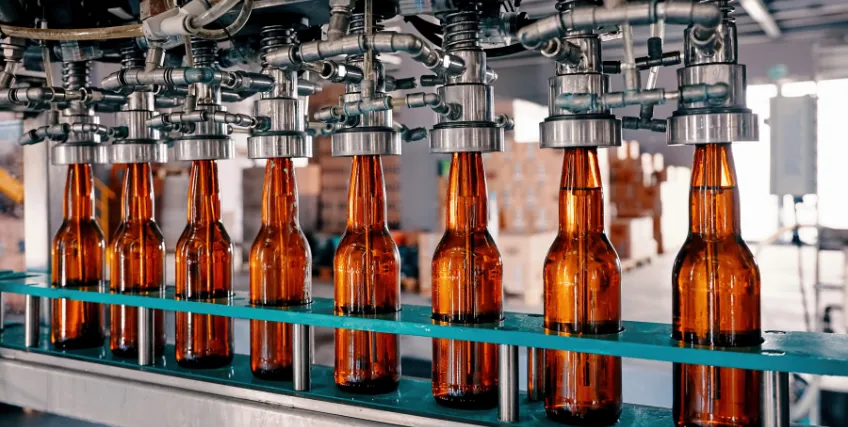Craft Your Next Big Batch
With a Brewery Business Loan
Looking for Business Financing?
Apply now for flexible business financing. Biz2Credit offers term loans, revenue-based financing, lines of credit, and commercial real estate loans to qualified businesses.
Set up a Biz2Credit account and apply for business financing
The craft beer scene in the U.S. is buzzing louder than ever. From small towns to hip city neighborhoods, independent breweries have popped up like fresh hops in harvest. But here's the thing: turning that passion for craft into a fully operational brewery? That takes serious cash. And that's where a brewery business loan often steps in.
Whether you're brewing IPAs in Asheville or stouts in Seattle, equipment, ingredients, permits, and staff aren’t cheap. Kegs, fermenters, a taproom buildout – all these items cost money before a single pint is poured. Even seasoned brewery owners looking to scale their operations can hit a funding wall without the right business financing in place.
According to the Brewers Association, the U.S. counted over 9,700 breweries in 2023, with small and craft brewery models dominating the list. Growth is strong, but so is competition. So, staying liquid (pun intended) matters, especially when your cash flow gets crunched between expansion and production costs.
Many entrepreneurs turn to funding options to push through. That might mean buying better brewing equipment, expanding the taproom, or just covering payroll through seasonal lulls. Either way, the need is clear. And without proper working capital, things can dry up fast, even with a great business plan.
If you’re in the business of craft beverages, chances are your journey will cross paths with a brewery business loan at some point. And hey, that’s not a bad thing.
Why Breweries Often Look for Financing
Brewing isn't a cheap hobby once it turns into a real business. Most brewery owners start small, but even small setups burn through cash quickly. Think about it: tanks, chillers, space rental, real estate, licenses, and a crew that knows what they’re doing. And none of that is free.
That’s why many business owners eventually seek out a brewery business loan. Not because they’re failing, but because staying ahead in a fast-growing industry requires upfront investment. Whether it’s to increase output or just stay compliant with state regulations, brewery loans help folks cover the bills before the profits pour in.
A big chunk of the cash goes into working capital. Breweries deal with seasonal demand. Your summer lager might sell like crazy in July but barely move in January. That gap in cash flow? It’s real, and it bites.
Then there’s equipment. Upgrading to new fermentation systems or adding a canning line? That could easily hit six figures. That’s when equipment financing or a brewery equipment loan starts making sense.
Breweries tend to face a unique combo of high startup costs and long ROI windows. So, many turn to SBA loans, lines of credit, or term loans to keep operations smooth.
At the end of the day, even the most successful brewery usually gets a financial push somewhere. That push often comes in the form of a brewery business loan.
Where Brewery Funding Usually Goes
Every brewery's spending plan looks a little different, but most follow a few common patterns. Whether it’s a brand-new operation or a fast-growing craft brewery, the costs stack up fast. Here’s where a brewery business loan usually ends up getting spent:
1. Brewery Equipment Purchase
Buying brewing equipment is almost always the biggest initial expense. Think fermenters, brew kettles, chillers, bottling or canning machines. Depending on the scale, that alone can eat up most of your capital. Many brewery owners use a brewery equipment loan to manage these upfront costs without draining all their cash. This helps with better cash flow management while still scaling production. Even used gear can cost tens of thousands. No joke.
2. Taproom or Brewpub Buildouts
A stylish, welcoming taproom isn't just for vibes; it drives profit. From building permits to interior work to kitchen gear, a taproom setup needs serious bucks. A brewery business loan helps cover those costs while you're still months away from opening day. If you’re building on your own real estate, costs can jump higher.
3. Inventory and Ingredients
You can’t brew without grains, hops, yeast, and water. But bulk buying those ingredients upfront requires working capital. Not to mention packaging, labels, and CO2 tanks. A brewery loan or line of credit often covers these recurring needs, especially when seasons change or suppliers hike prices.
4. Distribution and Marketing
Selling beer goes beyond brewing. You’ll need to package, store, and ship your product. Add social media, events, and branding costs. Without a solid business plan and some capital, your brew might not leave the basement. That’s where brewery startup financing or even short-term loan options come in handy.
What Types of Loans Can Breweries Use?
There’s no single way to fund a brewery. Depending on your goals, timeline, and how much capital you need, different loan products might fit better. A brewery business loan can come in many shapes — and choosing the right one can keep your growth plans on track.
1. Working Capital Loans
These are short-term loans that help cover daily costs like rent, payroll, or supplies. When brewery owners hit seasonal lulls or need to respond fast to demand spikes, working capital keeps things moving. A solid credit score helps get better interest rates, but some lenders offer options even for mid-range credit.
2. Equipment Loans
A go-to for buying brewing systems, tanks, canning lines, or even delivery vehicles. The equipment itself often acts as collateral, so you don’t always need deep pockets upfront. A brewery equipment loan helps spread the cost over months or years. Many business owners prefer this route to conserve cash.
3. SBA 7(a) Loan
SBA 7(a) loan is a favorite for startups and growing breweries. Backed by the Small Business Administration, it offers longer repayment terms and lower interest rates. It’s not super fast to get, but it’s worth the wait for those with a solid business plan. It can fund real estate, renovations, or even working capital.
4. Business Line of Credit
Need flexible access to capital? A business line of credit works like a credit card, but with higher limits. You draw what you need and pay interest only on that. Great for buying extra kegs, running promotions, or covering vendor invoices during slower months.
The Pros and Cons of a Brewery Business Loan
Like any kind of business financing, taking out a brewery business loan comes with its highs and lows. Let’s break it down. Understanding the tradeoffs helps brewery owners make smarter decisions before jumping in.
Pros
1. Enables Faster Growth
Without access to capital, your business might stay stuck. A brewery loan can help speed things up — adding tanks, opening a new taproom, or hiring more hands. Many successful breweries rely on external funding options to scale quicker than organic growth would allow. And that can be the edge you need in a crowded craft beer market.
2. Builds Credit and Business History
Taking out a small business loan and repaying it on time helps build your credit history. That matters when applying for bigger loan options down the road. It also shows lenders that you're a responsible borrower. Over time, it could increase your credit limit or improve interest rates on future loans.
Cons
1. Repayment Pressure
Monthly payments can be tough, especially during off-seasons or downturns. If your cash flow dips, meeting repayment terms becomes stressful. Missed payments might impact your credit score or force you to refinance under less favorable terms.
2. Not Easy for Startups
If you’re a brand-new craft brewery, getting approved for a brewery startup financing package can be tricky. Lenders often want financials, revenue history, or collateral. Without those, your loan may come with higher interest or might be denied altogether. That’s why many new entrepreneurs look to SBA loans or crowdfunding instead.
Brewery Financing Isn’t Always Easy
A brewery business loan sounds like the perfect fix until you start applying. That’s when many business owners hit unexpected roadblocks. The truth is, getting approved isn’t always a walk in the park.
One major hurdle? Documentation. Lenders want everything like tax returns, a polished business plan, licenses, forecasts. If you're a startup, that’s even harder to pull together. And without revenue history or strong collateral, your loan application could be rejected.
Even for established breweries, cash flow fluctuations make banks nervous. Breweries are seasonal by nature. You might crush it during summer but slow down in winter. That kind of unpredictability? It affects how a lender views your financing needs and repayment terms.
Credit is another roadblock. A weak credit score or short credit history? That can spike your interest rates, or worse, disqualify you from traditional business loans altogether. It’s why some craft brewers lean toward credit cards, crowdfunding, or short-term lending to fill the gap.
So yeah, brewery financing is possible but not without prep. Start early, know your numbers, and be ready to answer a hundred questions.
Trusted by Thousands of Small Business Owners in America.**
Simply because we get what you go through to build a business you believe in.
**Disclaimer: All stories are real, as told by real business owners. Customers do not receive monetary compensation for telling their stories.
From One Entrepreneur to Another: We Get You
We understand what's behind building a business you believe in.
All stories are real, as told by real business owners. Customers do not receive monetary compensation for telling their stories.



Articles on Brewery Business Loan
Understanding Small Business Loans for Breweries: A Guide for Craft Brewers
Small business loans for breweries can provide capital for working capital needs or to grow and develop your brewery business into a long-term...
Popular Business Loans for Craft Breweries: Funding Growth Without Diluting Ownership
The craft beer scene in America has exploded over the last decade. According to the Brewers Association, there are now...
Brewery Business Financing: Tips for Managing Costs and Cash Flow
The craft beer industry is a nearly-$30 billion industry and growing everyday, but behind the taps and tanks lies a constant...
Frequently Asked Questions About Brewery Business Loans
1. What is a brewery business loan typically used for?
A brewery business loan usually covers big expenses like buying brewing equipment, upgrading taprooms, hiring staff, or handling licensing fees. Some breweries also use funds to manage cash flow or purchase seasonal ingredients in bulk. Whether you're just starting out or trying to grow your footprint, this type of loan can give your brewery the push it needs. Just be sure your business plan supports the use of funds you're asking for.
2. Is it possible to get brewery startup financing with no prior revenue?
It might be possible but it’s not always easy. Many lenders prefer businesses with some revenue history, but SBA 7(a) loans or crowdfunding platforms are often good bets for startups. You'll need a strong pitch, solid projections, and detailed cost estimates for everything from fermentation tanks to social media marketing. A new craft brewery with a clear growth plan can definitely find the right backer but it takes effort.
3. Can I refinance an existing brewery business loan?
Refinancing a brewery loan can lower your interest rates, extend your terms, or free up some monthly working capital. It’s especially helpful if your credit has improved or if you're juggling multiple loan options. Some business owners also refinance to fund upgrades or expand production. Just remember that there might be fees involved, so compare the savings carefully.
4. Is a business line of credit better than a term loan for breweries?
It depends on your needs. A business line of credit gives you flexibility. You draw cash only when you need it. That’s great for unpredictable expenses like emergency repairs or extra kegs during a busy weekend. A term loan, on the other hand, is better for big, one-time purchases like brewing tanks or a new taproom. Many craft brewery owners use both at different stages.
5. Can a brewery business loan cover the cost of buying real estate?
If you’re buying your own brewing space or building a taproom, some loans like SBA 7(a) or real estate loans can help. It’s often better than leasing long-term. Many brewery owners prefer owning their facility for more control over their expansion, layout, and costs. Just be ready for a detailed application process.
Frequent searches leading to this page
Term Loans are made by Itria Ventures LLC or Cross River Bank, Member FDIC. This is not a deposit product. California residents: Itria Ventures LLC is licensed by the Department of Financial Protection and Innovation. Loans are made or arranged pursuant to California Financing Law License # 60DBO-35839



